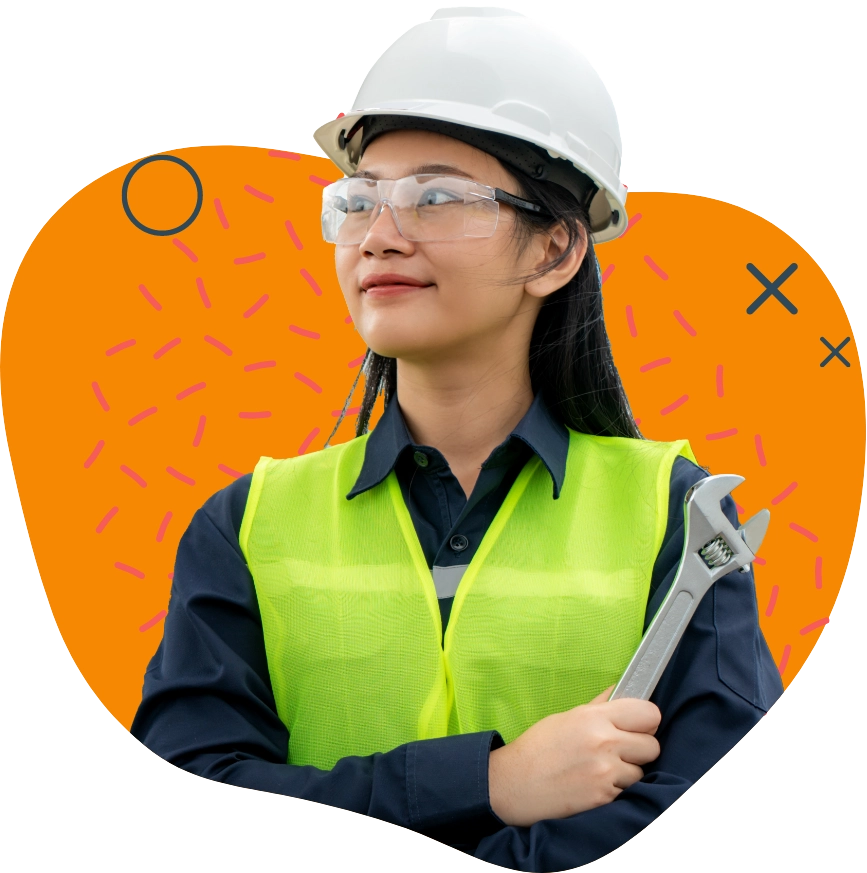Whether you are already in employment and looking to improve your skills, or have just left school or college and want to develop a career path, an engineering apprenticeship can set you on your way to a rewarding vocation.

Dempsey had always had an interest in Engineering and the way things work and took the leap to change his career direction with an Apprenticeship. He believes that having a trade with real skills is a chance to drive his career forward in the future.
“I wanted to change my life and realised that an Apprenticeship could be the route I was looking for. Derwent Training have supported me all the way. The atmosphere here is calm and friendly and I’m so pleased I made the decision to come here. Who knows where I will be able to go after this.”

Our 4-year Engineering Apprenticeship Programme allows you to build skills, knowledge and practical experience to succeed in your chosen career. You will combine both on-the-job learning at your employer with tuition from our trainers at our specialist engineering training facility in Malton one day per week. Your trainers will carry out formal 10-week checks on your progress and set new targets.
You will choose from 4 development pathways. This will set by the employer dependent on the role you are completing in the workplace:
The Level 3 Machinist Apprenticeship Standard has been developed to provide learners with the skills, knowledge and behaviours they need to carry out their role as a Machinist. Machinists are predominantly involved in highly skilled, complex and precision work, machining components from specialist materials using conventional tools such as centre lathes, vertical and horizontal milling machines, horizontal and cylindrical grinding machines, electro discharge machines, as well as single and multi-axis computerised numerical control (CNC) machine tools.
Three jobs that are applicable to the apprentice’s job role. They will need to collate evidence for their portfolio.
The Level 3 Mechatronics Maintenance Technician Apprenticeship Standard has been developed to provide learners with the skills, knowledge and behaviours they need to carry out their role. Mechatronics Maintenance Technicians ensure that plant and equipment perform to the required standard to facilitate production targets regarding safety, delivery, quality and cost within a high value manufacturing environment. Typically the work would cover a broad range of activities including installation, testing, fault-finding and the on-going planned maintenance of complex automated equipment.
The Level 3 Technical Support Technician Apprenticeship Standard has been developed to provide learners with the skills, knowledge and behaviours they need to carry out their role in Technical Support within an Engineering and Manufacturing environment. Technical Support Technicians work as part of a team to provide technical support for all areas of the Engineering and Manufacturing function, including process control, performance and continuous improvement solutions, production schedule/planning, produce technical applications and capability, product development and innovation, engineering drawings and quality control.
The Level 3 Metal Fabricator Apprenticeship Standard has been developed to provide learners with the skills, knowledge and behaviours they need to carry out their role. The broad purpose of this occupation is to carry out metal fabrication work using things such as rolled steel joists, columns, channels, steel plate and metal sheet etc. Work includes manufacturing bridges, oil rigs, ships, cranes, platforms, automotive and machinery parts, sheet metal enclosures, and anything that can be fabricated out of metal.
Portfolio of Evidence – Skills, Knowledge and Behaviours (Workplace)
A portfolio of 3 jobs to evidence Skills, Knowledge and Behaviours and will be collated with jobs the apprentice is doing in the workplace. This portfolio will be specific to the apprentice’s role.
The final assessment for every apprentice to ensure they are competent to be certified in the role they have been training for the duration of the apprenticeship. This will be carried out by an independent End-Point Assessment Organisation under exam conditions. Only once the apprentice passes their EPA will they be awarded their apprenticeship certificate.
There are two main pathways to applying for an Apprenticeship:
Apprenticeships are competitive and they are not like a full-time college course where you are guaranteed a place if you meet the entry requirements. You will need to be pro-active in applying for Apprenticeships, as well as preparing a CV and attending interviews’ with employers, just as you would for any job.
Entry Requirements
Useful Websites
You can access our Level 3 Engineering Apprenticeship Leaflet here.

The cost of the apprenticeship will be funded by the Government and your employer – there are no training costs to be paid by the apprentice.
As you are earning a wage, your employer may expect you to pay for your travel to Derwent Training for your attendance day. This may be via car, bus or train but every employer is different. It is your responsibility to get to and from the training centre for your off-the-job training.
What you earn as an apprentice will depend on your age, the apprenticeship standard and the location of the employer.
If you are 16-18, or 19 or over and in the first year of your apprenticeship then you may be entitled to the National Apprenticeship Minimum Wage. Many employers do pay more than this but as you are their employee it is their decision. You must be paid for:
You will usually get at least 20 days of paid annual leave plus bank holidays. You can find information on the National Minimum Wage here.